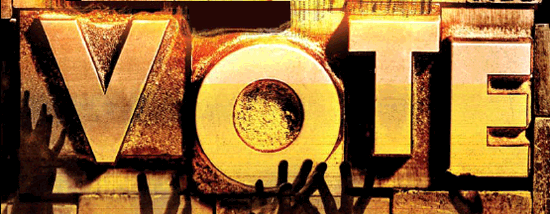 |
power of the vote
|
“If men were angels there would be no need for government,” wrote James Madison. He continued, “but men are not angels!”
An age-old adage insists that conversation about religion and politics subjects be avoided in social settings. Yet what could be more important for a Christian to discuss than his standing before God and his deep concern for promoting a peaceful and just society? While Christians may differ on the best choice of political candidate, we would all agree that the political decisions we make have long-term repercussions.
Government is a sacred or divine institution, according to Romans 13. A good government will subdue evil and protect and defend the good. Scripture even refers to public officials as ministers of God. In contrast, the Old Testament pronounces grave woes on those who make unjust laws. Bad governments (like bad marriages) are not from God, yet both marriage and government work well when carried out according to God’s plan.
By the People
The American system of government is unique. In the U.S. Constitution, our leaders wisely established a strong system of checks and balances for a mixture of reasons, ranging from their clear understanding of human depravity to the fear of a future King George.

Our founding fathers deeply feared the ability of any individual or oligarchy to control the political system and took aggressive measures to keep this from happening. The founders dealt with their own contemporary dilemmas while shaping the future. Their knowledge of history was remarkable, and they knew what they wanted, but they could not guarantee the future any more than we can today.
Protecting the Future
The framers of the Constitution understood clearly the corrupt nature of humanity. Theologians call it depravity or sinfulness. Men who are selfish by nature and protective of personal interests can only live together, respect one another, and avoid harming one another only by adhering to a system of social laws and government. Exploitation for personal gain is obvious in some and latent in the rest of us, even Christians.
In a letter to her husband John, Abigail Adams quoted Daniel Defoe who said, “Remember that all men would be tyrants if they could.” The ability of our founding fathers to create a political structure that limits the legal rise of a demagogue or self-styled, charismatic leader borders on the miraculous.
Yet the formation of a political system aware of human corruption and structured to suppress selfishness is only part of the equation. Any good government must exalt the noble qualities that establish a higher level of human community. Citizen virtue and leadership virtue, according to our founders, were considered necessary (even when violated) for the best human government. Cicero stated, “The people’s good is the highest law.”
John Adams reinforced this idea when he wrote, “the happiness of the people was the purpose of government.” He continued, “And since all sober inquirers after truth agreed that happiness derived from virtue, that form of government with virtue as its foundation was more likely than any other to promote the general happiness.”
To put it most simply, bad people cannot produce good government. Good people can create good government and dilute or soften the effects of bad government.
George Washington, with his hand on a Bible, swore a public oath to “preserve, protect, and defend the Constitution of the United States,” and added, “So help me God.” Immediately, he kissed the Bible. His respect for the Bible and a widespread commitment to the Constitution by both ordinary citizens and the founders of our nation gave this country sound footing.
For the People
The American political system was designed for citizen participation. An informed, virtuous citizenry combined with a system of law that respects God results in ideal conditions for human government. The Constitution made provisions for considerable freedom, but such freedom comes only with a great deal of individual responsibility.
Citizens elect one of their own to lead. When necessary, they appeal to elected officials to impeach those who have exploited their positions. This direct democracy applies at the local and state levels, but is limited in the federal system (except in the House of Representatives where citizens choose peers from their individual districts to “represent” them).
A republican form of government with democratic elements comprises the national or federal system of government. No single person or body controls the entire political body. Senators are chosen by state legislatures. Citizens elect members of the House of Representatives. Supreme Court justices are recommended by the President and approved by the Senate, while the President is selected by the electoral college.
A Christian Duty
Some believers today think Christians should stay out of politics, turning their attention instead to promoting the gospel. They write off the governmental system as corrupt to the core. Their mindset is, “You don’t polish the brass of a sinking ship.” Instead, they direct their abilities and talents to the church and its ministries.
On the other hand, many conscientious Christians are well versed in the world of politics and government and even participate at times. They follow the salt and light effect of Jesus’ direct command to His followers (Matthew 5:13; Mark 9:50; Luke 14:34). Edmund Burke’s advice, “For evil to triumph, good men need do nothing,” remains timely.
Daniel and Nehemiah, under great duress, remained loyal to God in distant and pagan courts and captured the attention of the highest political leaders because of their biblical character, wisdom, and obvious leadership skills. Jesus and Paul both dealt with Jewish and Roman leaders, confronting them with their personal and professional wrongs. John the Baptist pronounced an unwanted condemnation of Herod’s incestuous relationship, and it cost him his life.
His actions obviously met Jesus’ approval when He said no one in the kingdom was greater than John.
How, then, can a conscientious Christian take an active role in today’s American politics? More appropriately, how can today’s Christian best fulfill his or her responsibilities as an American citizen? Consider the following suggestions:
-
Keep a healthy skepticism of those in the political arena. Some naively vote on the basis of dimples, smiles, speeches, geography, Ivy League degrees, or other superficial characteristics. Looks and social status are of minimal value. In his play Hamlet, Shakespeare said, “One may smile and smile and be a villain.” Politics changes rapidly, often producing strange bedfellows.
-
Know the voting record of candidates. What one says and how one votes are often at odds. History reveals the correlation between what one has done and what he will do. Lenin wrote, “A lie told often enough becomes truth.” Understanding truth often takes hard work. Take your citizenship to the next level by becoming an educated voter.
-
Know that every vote matters. Remember Florida 2000? Hanging chads. Confused voters. The presidential race decided by a handful of votes. Many races are decided by small margins.
-
Be aware that dual citizenship by its nature creates tension. The world of God and Caesar often compete and collide. The standards of Christ’s kingdom must win, even when those standards don’t have the flare, the charisma, or the money.
-
VOTE.
ABOUT THE WRITER: John Carter is the chairman of the History Department at Free Will Baptist Bible College. He is a member of Cross Timbers FWB Church in Nashville, TN.
The Millennial Generation
Today’s college students face a new and confusing world in American politics. As the lines blur, and the world around them insists that right and wrong are simply words on a page, how do Christian students respond?

“Voting is not only our right as Americans, but as Christians, it is our duty. We are not to be immersed solely in political parties or individual candidates, but rather we are to take a Biblical stance on real issues.”
—Jesse Owens, Sophomore
“Failing to let your voice be heard is essentially throwing your voice behind the popular movement of
the day.” —Jeremy Buhro, Sophomore
“It is our obligation as Christians to be a positive influence on a vastly unbelieving nation.”
—
Christopher Talbot, Sophomore
“Voting determines our future not just for eight years, but for our children’s children.”
—Kevin Murray, Sophomore
“In a society that is seemingly becoming anti-Christian, we need to be active so our cause will not be weakened.” —Ben Wheeler, Senior
"While many Christians consider their individual voices and votes to have very little impact in the political arena, those same Christians must remember that they have been entrusted with the responsibility of promoting God’s Truth in all areas of life, even in their local and national governments.
Therefore, we must assume the task of actively promoting the development and implementation of moral laws and honorable leaders in the United States government."
—Audra Bridgeman, Senior
"It is important for Christians to vote because our participation in the U. S. political forum represents the voice of truth and light in a dark and fallen world. Just as many small stars make up the universe and grains of sand make the beach, each vote matters in the overall scheme of the future of U. S. democracy."
—Mary Kathryn Driggers, Junior
|

